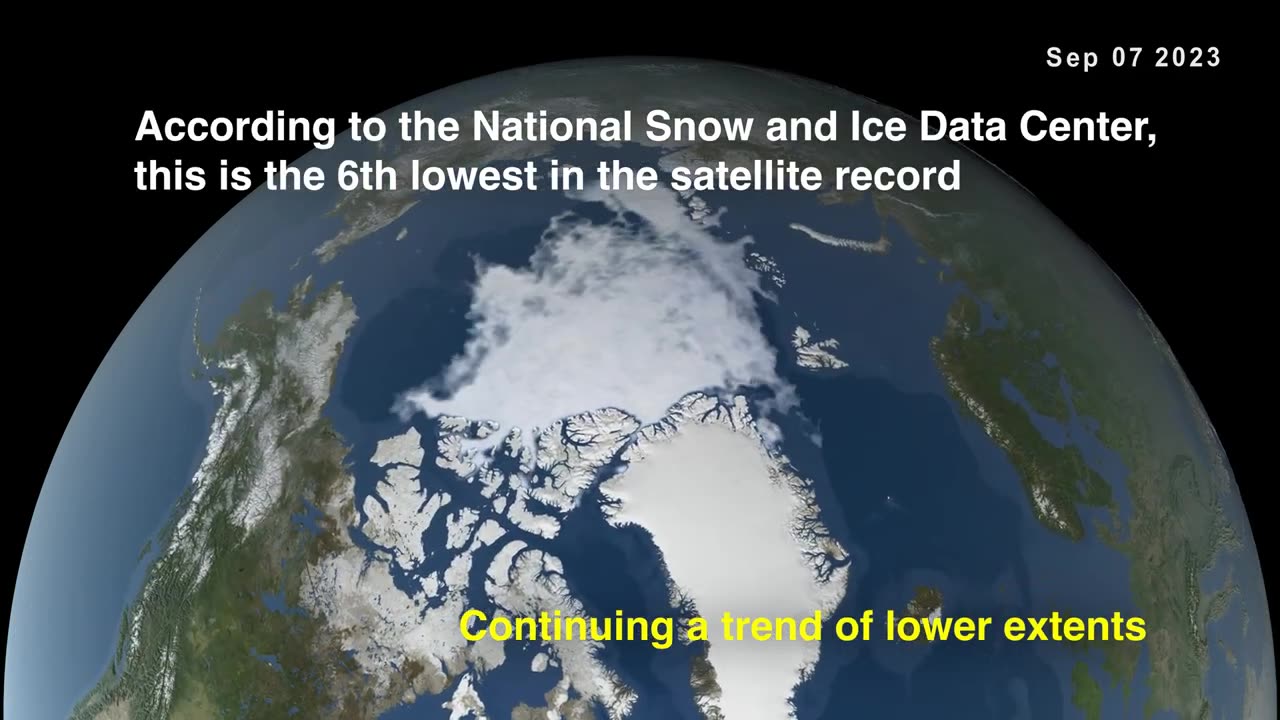Premium Only Content

Arctic Sea Ice Hits Annual Minimum, Antarctic Sets New Record
**Arctic and Antarctic Sea Ice at Record Lows in 2023**
Arctic sea ice reached its annual minimum extent on September 19, 2023, at 4.23 million square kilometers (1.63 million square miles), making it the sixth-lowest year in the satellite record. Antarctic sea ice, meanwhile, reached its lowest maximum extent on record on September 10 at 16.96 million square kilometers (6.55 million square miles).
These record lows are a sign of the ongoing and accelerating loss of sea ice due to climate change. Sea ice plays an important role in the Earth's climate system by reflecting sunlight back into space, regulating ocean temperatures, and providing habitat for wildlife.
The loss of sea ice is having a number of negative impacts on the Arctic and Antarctic ecosystems. For example, it is making it more difficult for polar bears to find food and for seals to raise their pups. It is also leading to more coastal erosion and flooding, and it is disrupting the livelihoods of Indigenous communities.
The loss of sea ice is also having a global impact. For example, it is contributing to sea level rise and it is making weather patterns more extreme.
The record lows in Arctic and Antarctic sea ice in 2023 are a stark reminder of the urgency of addressing climate change. We need to take immediate action to reduce greenhouse gas emissions and transition to a clean energy economy.
**Here are some of the specific impacts of the loss of sea ice:**
* **Wildlife:** Sea ice provides habitat for a variety of wildlife, including polar bears, seals, walruses, and penguins. As the sea ice melts, these animals are losing their homes and food sources.
* **Indigenous communities:** Many Indigenous communities in the Arctic and Antarctic rely on sea ice for hunting, fishing, and transportation. The loss of sea ice is disrupting their livelihoods and culture.
* **Coastal erosion and flooding:** As the sea ice melts, it exposes more coastline to waves and storms. This is leading to more coastal erosion and flooding, which is damaging homes and infrastructure.
* **Sea level rise:** Sea ice floats on the ocean, so it does not contribute to sea level rise when it melts. However, the melting of glaciers and ice sheets does contribute to sea level rise. The loss of sea ice is making it easier for glaciers and ice sheets to melt, which is accelerating sea level rise.
* **Weather patterns:** Sea ice plays a role in regulating ocean temperatures and weather patterns. The loss of sea ice is contributing to more extreme weather events, such as heat waves, storms, and floods.
The loss of sea ice is a serious problem, but it is not too late to take action. By reducing greenhouse gas emissions, we can slow the melting of sea ice and protect the Arctic and Antarctic ecosystems.
-
 43:09
43:09
BonginoReport
8 hours agoJOHN ROCKER UNCAGED! - Nightly Scroll w/ Hayley Caronia (Ep.153)
25.5K6 -
 1:29:04
1:29:04
Kim Iversen
2 hours agoHe Tried to Overthrow Maduro — He Says the U.S. Government Set Him Up
53.2K24 -
 21:17
21:17
Jasmin Laine
2 hours ago"Human WRECKING BALL!"—Poilievre’s BRUTAL Take Leaves Reporters STUNNED
36210 -
 LIVE
LIVE
Bare Knuckle Fighting Championship
3 days agoBKFC ICE WARS 3: Laporte vs Lafferière
81 watching -
 LIVE
LIVE
The Mike Schwartz Show
4 hours agoTHE MIKE SCHWARTZ SHOW Evening Edition 10-10-2025
2,895 watching -
 LIVE
LIVE
Total Horse Channel
7 hours ago2025 Quarter Horse Congress | Friday Night PBR
23 watching -
 2:33:19
2:33:19
Right Side Broadcasting Network
8 hours agoLIVE REPLAY: President Trump Makes an Announcement - 10/10/25
64K18 -
 1:53:46
1:53:46
Roseanne Barr
3 hours agoTim Pool | The Roseanne Barr Podcast #119
74.2K48 -
 1:02:20
1:02:20
The White House
2 hours agoPresident Trump Makes an Announcement, Oct. 10, 2025
16K -
 LIVE
LIVE
The Jimmy Dore Show
3 hours agoGaza Ceasefire Is ON — But Will It Hold? Trump CONSIDERING Ghislaine Maxwell Pardon! w/ Ian Carroll
9,588 watching